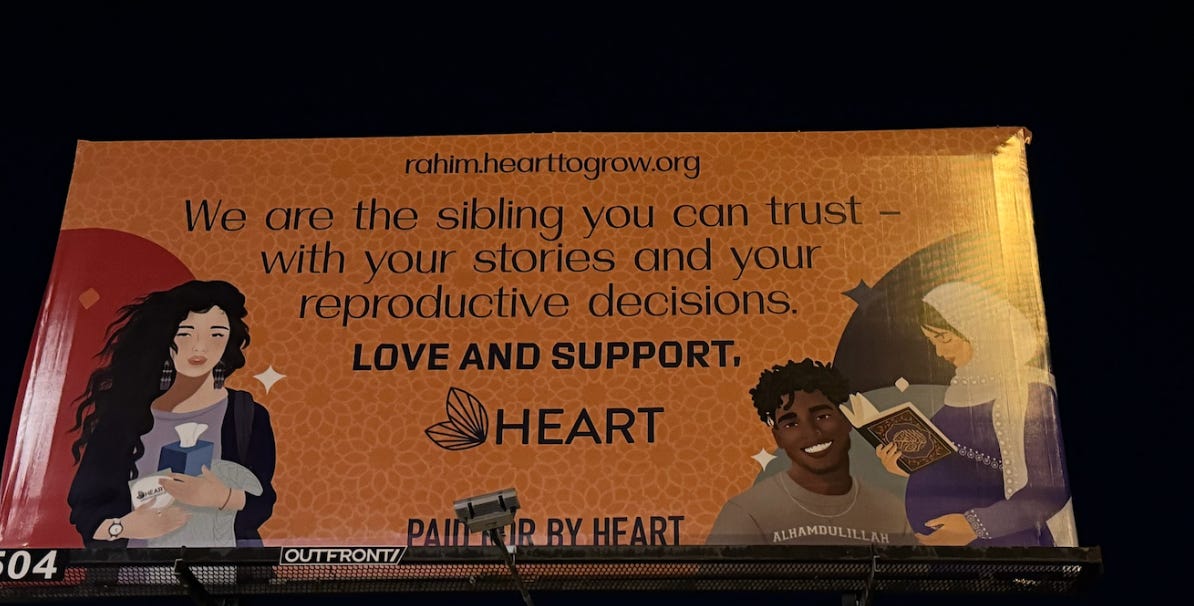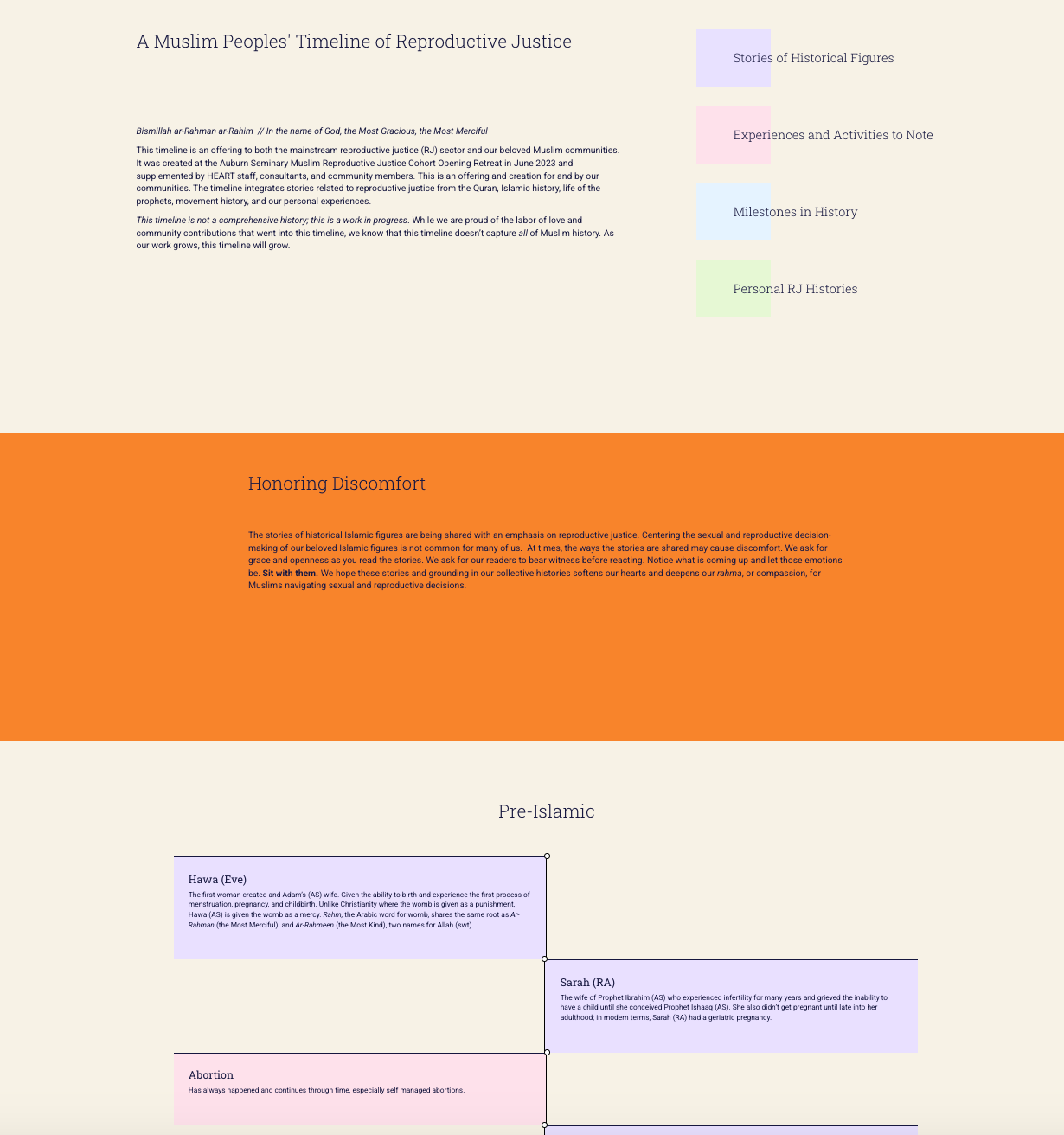'This Isn't Some Western Liberal Concept': Uncovering Islam's Historic Support for Reproductive Agency
From abortion bans to faith-based stigma, Muslim Americans face unique challenges in today’s reproductive health crisis.
Sahar Pirzada was elated when she found out she was pregnant in 2018 after four years of trying. She could never imagine that she’d end up getting an abortion.
Her baby had trisomy 18 or Edwards syndrome—an incurable and rare genetic condition that almost always ends in miscarriage or stillbirth. She made the heart-wrenching decision to terminate the pregnancy.
Today, as Director of Movement Building at HEART (Health Education Advocacy Research and Training)—a nonprofit organization whose mission is to promote sexual health, uproot gendered violence, and advance reproductive justice by establishing choice and access for the most impacted Muslims—Pirzada reflects on her experience with a new sense of urgency in the aftermath of the Supreme Court's overturning of Roe v. Wade in 2022 and the subsequent wave of abortion bans across more than a dozen states.
"When I needed abortion care, I had options," Pirzada explains. "Today, millions of Americans—including countless Muslims—face barriers that I didn't, forcing impossible choices between faith, health, and the law."
This reality has transformed what was already deeply personal work into something even more critical. Now, through HEART's recently launched RAHIM project—Reproductive Agency Honoring Impacted Muslims—the organization is creating resources for Muslims facing even greater challenges than she did just a few years ago.
"This work with reproductive justice is very much tied to my own lived experience as a Muslim woman navigating this world," Pirzada shares.
Immigrant Communities and Women of Color at the Intersection of Vulnerability
For Muslim immigrant communities and women of color, the reproductive rights crisis represents a particularly dangerous convergence of threats. These communities already face significant barriers to healthcare access, including language barriers, cultural stigma, immigration status concerns, and systemic racism within the healthcare system.
"The mistrust that they have with the state is one element of it. The mistrust that they have with the medical industry as a whole and the healthcare industry is another one," explains Pirzada.
Muslim women from immigrant backgrounds often face additional challenges navigating a healthcare system that may be unfamiliar with their cultural practices or religious concerns. These challenges are compounded by systemic inequities. For instance, Black women in the U.S. experience maternal mortality rates nearly three times higher than those of white women, while Indigenous women face more than twice the risk.
Research also indicates that American Muslim women have lower utilization across a range of health services compared to other groups, suggesting that patient delay might be prevalent as a partial explanation for such health disparities. A survey conducted by HEART in 2022 reveals troubling statistics about Muslims' reproductive healthcare experiences. Forty-two percent of Muslim respondents reported experiencing sexual pain or dysfunction, and of those, sixty-five percent had never sought help from healthcare providers due to shame, lack of knowledge about treatments, or not knowing where to find help. These disparities underscore the urgent need for culturally competent and accessible healthcare services that address the unique needs of Muslim women.
Historical Context: Islam's Nuanced Approach to Reproductive Health
Contrary to popular misconceptions that portray Islam as uniformly conservative on reproductive issues, historical Islamic scholarship reveals a tradition with diverse viewpoints and remarkable flexibility. The RAHIM project includes a "Muslim People's History of Reproduction" timeline highlighting examples throughout Islamic history that demonstrate support for reproductive decision-making.
"There are many examples within our Islamic history that show we've already been practicing reproductive justice as Muslims," Pirzada explains. "This isn't some western liberal feminist concept—it's actually something that historically we have supported and practiced."
This nuance is often overshadowed by dominant narratives shaped by other religious influences. In the U.S., the history of political opposition to abortion has been largely driven by evangelical and Catholic traditionalism. Professor Zahra Ayubi, who teaches Islamic ethics at Dartmouth College, points out that this influence has extended into some Muslim spaces as well.
“Muslim communities that happen to be conservative are very much influenced by Christian discourses on abortion,” Ayubi told NPR. “Not just within the United States in the last fifty or seventy-five years, but even over the last three hundred years because of colonialism.”
Today's political landscape has created urgent new challenges. Muslims, like other Americans, must navigate increasingly restrictive state laws that limit access to abortion and potentially other reproductive healthcare.
"Folks are navigating not only this religious landscape and the medical landscape, but a political landscape," Pirzada emphasizes. "Within that political landscape, we're seeing so much racism, white Christian nationalism, and misogyny."
The organization stresses that current abortion bans affect far more than elective procedures. Many people are shocked to learn that procedures for managing miscarriages are medically identical to abortion procedures. "By restricting abortion care, you're not only restricting elective abortion care, you're restricting access to reproductive healthcare," Pirzada explains. "That blows people's minds. They don't make that connection."
For immigrant communities, these restrictions can be particularly devastating. Language barriers may prevent clear understanding of new laws, while fear of immigration enforcement might deter undocumented Muslims from seeking care even when legally available.
Creating a Faith-Centered Support Network
To address these challenges, HEART is building a comprehensive support system anchored in Islamic values. After extensive conversations with community members, medical professionals, and Islamic scholars, they identified eight Islamic values that inform their reproductive justice framework.
These values shape "the world of RAHIM," which includes eight characters representing different professions someone might encounter when navigating reproductive health decisions. The project includes:
Educational resources grounded in both Islamic values and medical accuracy
A referral network connecting Muslims to trusted healthcare providers
A reproductive justice fund helping individuals access care despite financial barriers
Case management services for personalized support
Collaboration with Muslim doulas and midwives who provide culturally responsive care
The organization is particularly enthusiastic about their work with doulas and birth workers, noting that many Muslims are drawn to this work as an expression of religious values. "It's part of our religious culture to care for folk," says Pirzada, referencing the Islamic concept of "kifaya"—the communal responsibility to show up for people when they need you most.
Several HEART team members have even begun the process of becoming certified doulas themselves, recognizing what Pirzada calls "a calling for so many in our communities to play support system roles."
HEART's collaboration with organizations like the Ad’iya collective (abortion doulas who hold space for Muslims who have had abortions) and the Muslim Birth Workers Collective highlights their commitment to culturally responsive care that addresses the specific needs of Muslim women of color and immigrants.
Distinguishing Personal Faith from Public Policy
A crucial aspect of HEART's work also involves helping Muslims distinguish between personal religious beliefs and positions on public policy that minimize harm to vulnerable communities.
"Your communal responsibility is to care for people, to make sure that you're standing up firmly against any kind of injustice," Pirzada explains. "The attacks on reproductive rights are an injustice—they're reproductive violence and reproductive oppression."
HEART argues that from an Islamic ethical standpoint, supporting policies that restrict reproductive healthcare access causes greater harm than allowing individuals to make their own choices according to their conscience and circumstances.
"In that regard, it's incumbent upon all Muslims in our opinion that we fight for full access to reproductive care and put trust back in the individual to make the decision that's best for themselves," says Pirzada.
Building Trust for the Future
As reproductive healthcare access becomes increasingly restricted across America, HEART's work provides a vital resource for Muslim Americans seeking to make informed decisions aligned with both their faith and their individual circumstances. Through the RAHIM project, they're creating space for Muslims to exercise agency in their reproductive lives while remaining connected to their religious values and community—even amidst unprecedented challenges to reproductive freedom.
The organization aims to become "the trusted sibling within Muslim communities" when it comes to reproductive health. While they acknowledge that building trust takes time and not everyone is ready to hear their message, the response so far has been "overwhelmingly positive."
For immigrant Muslims and women of color in particular, HEART's approach offers something rare and precious: healthcare guidance that doesn't force them to choose between their cultural identity and their well-being but instead affirms and supports both.
"We've really created a sense of belonging for so many folks who have been navigating things in isolation," Pirzada shares.
Perfect—here's the Policy Watch blurb updated with direct action links to help your readers take the next step easily:
🔍 Policy Watch: Protecting Reproductive Freedom for All
As abortion bans continue to spread across the U.S., millions—especially immigrants, people of color, and religious minorities—are being denied care rooted in dignity and autonomy. One way to push back: support the reintroduction and passage of the Women’s Health Protection Act (WHPA).
This federal bill would safeguard the right to abortion across all states, ensuring that people—regardless of zip code, income, or faith—can make reproductive decisions free from political interference. For Muslims navigating complex health and religious choices, WHPA affirms the right to follow one’s conscience while accessing compassionate, culturally competent care.
📞 Call your representatives: CallMyRep.org
📍 Find your members of Congress: House | Senate
📢 Learn more about WHPA & take action: All Above All



